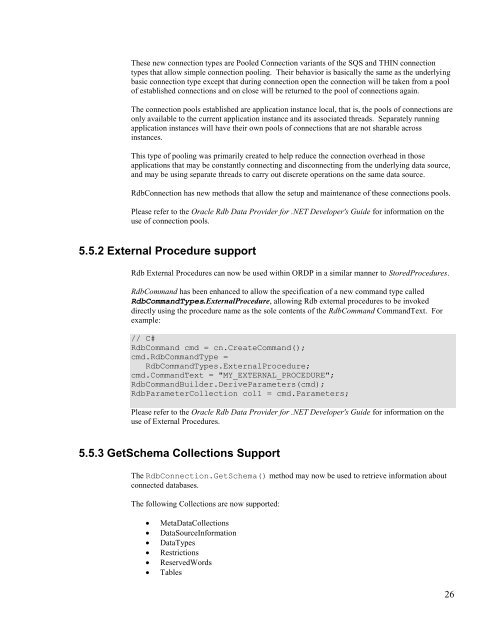Oracle® Rdb Data Provider for .NET - Downloads - Oracle
Oracle® Rdb Data Provider for .NET - Downloads - Oracle
Oracle® Rdb Data Provider for .NET - Downloads - Oracle
You also want an ePaper? Increase the reach of your titles
YUMPU automatically turns print PDFs into web optimized ePapers that Google loves.
These new connection types are Pooled Connection variants of the SQS and THIN connection<br />
types that allow simple connection pooling. Their behavior is basically the same as the underlying<br />
basic connection type except that during connection open the connection will be taken from a pool<br />
of established connections and on close will be returned to the pool of connections again.<br />
The connection pools established are application instance local, that is, the pools of connections are<br />
only available to the current application instance and its associated threads. Separately running<br />
application instances will have their own pools of connections that are not sharable across<br />
instances.<br />
This type of pooling was primarily created to help reduce the connection overhead in those<br />
applications that may be constantly connecting and disconnecting from the underlying data source,<br />
and may be using separate threads to carry out discrete operations on the same data source.<br />
<strong>Rdb</strong>Connection has new methods that allow the setup and maintenance of these connections pools.<br />
Please refer to the <strong>Oracle</strong> <strong>Rdb</strong> <strong>Data</strong> <strong>Provider</strong> <strong>for</strong> .<strong>NET</strong> Developer's Guide <strong>for</strong> in<strong>for</strong>mation on the<br />
use of connection pools.<br />
5.5.2 External Procedure support<br />
<strong>Rdb</strong> External Procedures can now be used within ORDP in a similar manner to StoredProcedures.<br />
<strong>Rdb</strong>Command has been enhanced to allow the specification of a new command type called<br />
<strong>Rdb</strong>CommandTypes.ExternalProcedure, allowing <strong>Rdb</strong> external procedures to be invoked<br />
directly using the procedure name as the sole contents of the <strong>Rdb</strong>Command CommandText. For<br />
example:<br />
// C#<br />
<strong>Rdb</strong>Command cmd = cn.CreateCommand();<br />
cmd.<strong>Rdb</strong>CommandType =<br />
<strong>Rdb</strong>CommandTypes.ExternalProcedure;<br />
cmd.CommandText = "MY_EXTERNAL_PROCEDURE";<br />
<strong>Rdb</strong>CommandBuilder.DeriveParameters(cmd);<br />
<strong>Rdb</strong>ParameterCollection col1 = cmd.Parameters;<br />
Please refer to the <strong>Oracle</strong> <strong>Rdb</strong> <strong>Data</strong> <strong>Provider</strong> <strong>for</strong> .<strong>NET</strong> Developer's Guide <strong>for</strong> in<strong>for</strong>mation on the<br />
use of External Procedures.<br />
5.5.3 GetSchema Collections Support<br />
The <strong>Rdb</strong>Connection.GetSchema() method may now be used to retrieve in<strong>for</strong>mation about<br />
connected databases.<br />
The following Collections are now supported:<br />
� Meta<strong>Data</strong>Collections<br />
� <strong>Data</strong>SourceIn<strong>for</strong>mation<br />
� <strong>Data</strong>Types<br />
� Restrictions<br />
� ReservedWords<br />
� Tables<br />
26

















